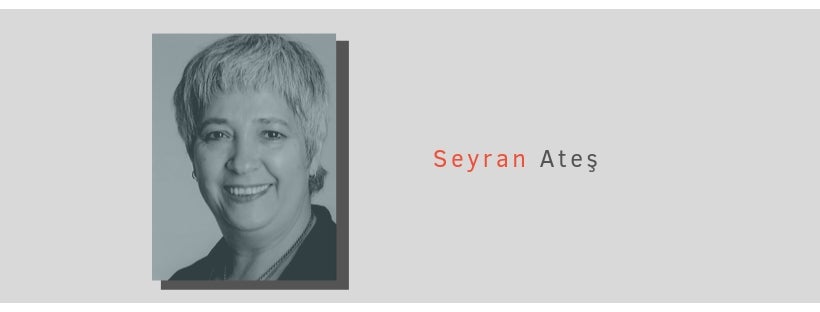
Factsheet: Seyran Ateş
IMPACT: Seyran Ateş is a lawyer and author of five books on Islam, violence, and sexuality. Ateş uses her personal experiences to make generalized claims about Islam and “Muslim culture,” often reinforcing the “good Muslim/bad Muslim” trope.
Seyran Ateş is a German-Turkish lawyer, feminist, author, and the founder and first female Imam of the Ibn Rushd-Goethe mosque in Berlin. The mosque states it welcomes all “but rejects visitors wearing the burqa or the niqab,” which Ateş describes as a “political statement.” In 2018 Ateş was a founding member of the Initiative of a Secular Islam, which calls for a contemporary German Islam that “‘is fully compatible with human rights’ and independent of foreign bodies.
In her 2007 book, The Multicultural Mistake: How We Can Live Together Better in Germany, Ateş argues that the decision to wear a hijab is primarily based on social pressures to be part of the Muslim community. In a 2009 interview Ateş stated, “As far as I’m concerned, this headscarf is nothing but an expression of oppression and inhibition, and of the fact that the men would prefer to hide the women.” In 2018, she served as the lawyer of the Berlin Education Administration in a case involving a teacher who sued the state for not allowing her to teach while wearing a hijab. In court Ateş warned, “Just by wearing the headscarf she signals the strict interpretation of Islam, that the woman must be hidden from the eyes of men.” Ateş has also claimed that women in Turkey and Germany are getting paid to wear the hijab.
In The Multicultural Mistake, Ateş states that Muslims create a “parallel society” (Parallelgesellschaft): “Parallel societies exist in Germany..They follow the declared goal to change the structure of our majority society, which does not go hand in hand with their own culture. The majority society shall adapt to the traditions and Gewohnheiten (customs) of the (Muslim) minority or even submit to them. We are facing a very strong, conscious and partly very arrogant Muslim (no matter if observant or not) community, which has created its own world, apart from the majority society. They have their own legislative, judiciary, and executive power. In this world, it is not necessary and often not erwünscht (desired) to be in contact with original Germans (Urdeutsche).” The allegations of Muslim “parallel societies” have been used by politicians and anti-Muslim figureheads to support discriminatory policies aimed at Muslims.
Ateş has repeatedly made problematic and generalized statements without any supporting evidence. In a 2007 interview, Ateş was asked to quantify her claim that “many Muslim women still live in an archaic parallel world, where structures dominate that are familiar to us from the Middle Ages…. The interviewer asked her “how many migrants live in this parallel society?” Ateş responded, “There are no studies. But my feeling is that at least eighty percent of the people coming to Germany from Turkey live in this parallel society.”
In 2009, Ateş published another book entitled, Islam Needs a Sexual Revolution. In a 2009 interview with Speigel, Ateş stated she believes “that the Islamic world must grapple with the consequences of rigid sexual morals…It must pursue the path of change, just as any totalitarian system must do when it wants to become a democratic society.” When the interviewer noted that “it’s impossible to refer to Muslims as a uniform group,” Ateş responded, “I think it is possible. There is a strong cultural connection among the world’s Muslims: religion. I find that it’s a wonderful religion, but the cultural interpretation of this religion has led to sexual repression.”
In 2009, Thilo Sarrazin, a board member at the Bundesbank (Germany’s central bank), stated: “A large number of Arabs and Turks in this city, whose numbers have grown thanks to the wrong policies, have no productive function except selling fruit and vegetables.” When asked if Sarrazin was right about his complaints, Ateş stated, “I believe that Mr. Sarrazin’s remarks were to the point and correct. We have serious problems in our multicultural society.”
Right-wing politicians have used Ateş’ writings to legitimize their anti-Muslim paranoia of an alleged “Islamization” of Europe. In 2018, she accepted an invitation by right-wing and leading anti-Muslim politicians, including former vice-chancellor and leader of the Austrian Freedom Party, Heinz-Christian Strache.
In 2017, she was invited by the Austrian ÖIF to the 14th meeting of the Integration Advisory Council where she warned against “leaving refugees to the influence of radical mosque associations,” thus criminalizing Muslim organizations while presenting her own liberal Islam as the only good version of Islam.
Ateş co-founded the “European Citizens’ Initiative Against Extremism”, which was recognized on in 2017 by the European Commission. The 2017 European Islamophobia report noted, “The initiative, which came under criticism when leaks by the weekly Falter revealed that more than €20,000, the budget specified by the EU Commission, could potentially be used to restrict Muslims’ religious activities.” The initiative calls for “the introduction of a joint, EU-wide watch list to which individuals and organizations with an extremist background could be added” as well as for the introduction of an “Extremism-free” certification for organizations and businesses.
In 2005, Ateş was named Germany’s woman of the year for her work in “defense of Muslim women in immigrant communities.” Sociologist Florian Kreutzer has argued that with her campaign for women’s rights, Ateş often ends up generalizing her own experiences as the experiences of all Muslims.
Updated October 4, 2019

 Search
Search